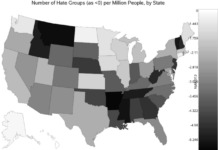After informing G7 leaders he will make a “final decision on the Paris accord next week,” President Donald Trump took exactly one day to conclude cutting domestic greenhouse gas emissions 26-28 percent below 2005 levels by 2025 is simply not worth it.
Denial is not a river in Egypt, but if it were, it would be rising at pace with its other aqueous counterparts due to man-made climate change.
So while President Trump is digging in his intransigent heels over a “Chinese hoax,” we need not look any further for climate change’s exigencies than our Alaskan brothers and sisters confronting effects of three record-breaking years of warmth following decades of rising temperatures, sea levels, and melting permafrost.
Residents of coastal Alaskan villages have for years watched the sea gradually devour their towns or cause their towns to sink as the permafrost beneath transforms from solid ice into swampland.
The epicenter is Newtok, an Alaska Native village in the Yukon River Delta. Residents have been trying to relocate for decades as permafrost erodes and the nearby Ninglick River eats away at its banks to the tune of 70 feet per year.
Romy Cadiente, the village relocation coordinator, told NPR in January:
“We just need to get out of there for the safety of the 450 people there.”
Newtok’s residents have started building a new village further inland, but they don’t have the $60 million to finish and relocate. Much of Newtok’s infrastructure will be inundated by 2020.
Sally Russell Cox is a community planner overseeing climate adaptation for the Alaska state government. She said:
“We have a plan for doing it, we know all the different components that have to be done and the sequencing for how it has to happen. If there was designated funding for Newtok they’d be done within two years — they’d be completely moved over.”
Alaska’s government is primarily reliant on oil revenue. Plunging prices and production have cast the state’s budget into disarray.
During the Obama administration, Cox was able to receive funds from various departments and agencies, including the Bureau of Indian Affairs (BIA) and the Commerce Department. The Department of Defense (DOD) sent soldiers-in-training to help begin constructing a new Newtok village. President Barack Obama proposed providing $400 million for Arctic village relocation. Due the Republican-led Congress during most of Obama’s tenure, though, that money never arrived.
A 2009 Government Accountability Office report found that at least twelve of the thirty-one most highly threatened villages hoped to move. Only Newtok has been able to find a suitable location, though.
Kivalina is one example. It is a village on a barrier island 500 miles north of Newtok, inside the Arctic circle. Kivalina residents found a new site to move to, but the Army Corps of Engineers deemed it unsafe.
Kivalina is expected to be underwater within a decade.
The federal government has only to relocate a single community threatened by climate change. In 2016, the Department of Housing and Urban Development (HUD) awarded a community on Isle de Jean Charles, La. $50 million to move to safer ground. Alaska also applied but was denied. In January, before the Trump administration took over, Newtok asked the Obama administration for Federal Emergency Management Agency funding, but administration rejected the request, citing the community was not experiencing the type of disaster FEMA was meant to address.
And that’s with a president who took the existential threat of climate change seriously.
With Trump’s flat-out denial climate change even exists, Victoria Herrmann, president and managing director of the Arctic Institute, is not confident this administration will even bother listening to anyone. She said:
“There is no real reason to believe that infrastructure assistance for adaptation or relocation for Alaskan communities — or otherwise — will be made available under an administration that is skeptical of climate change and actively trying to backtrack on any progress made on greenhouse gas mitigation and adaptation efforts.”
But Sally Russell Cox isn’t ready to give up on the Trump administration. She said:
“Maybe they’ll take a stance that they’re ok providing assistance to these communities because of erosion and flooding and permafrost degradation, but we don’t want to call it climate change. The impacts are not going to go away, whether you think its climate change or not. The impacts are going to continue to happen and they’re going to continue to need help.”
Trump’s stance against the Paris Climate accord and climate change appears less principled than financial, it seems. He recognizes climate change is a problem when it pertains to his business interests. A case in point is Trump’s battle with the European Union over building sea walls to protect his golf courses from rising sea levels.
According to the Washington Post:
“Trump has cited his tangle over the golf-course wall as Exhibit A in justifying a jaundiced view of the E.U. that puts him at odds with decades of bipartisan U.S. foreign policy.”
Isn’t it supposed to be all about us?
Check out this news report on how Trump will damage our relations with all nations even further by pulling out of the Paris Accord (after the jump):
https://www.youtube.com/watch?v=K4KQQFu6BJ4
Featured Image Via YouTube Video.




